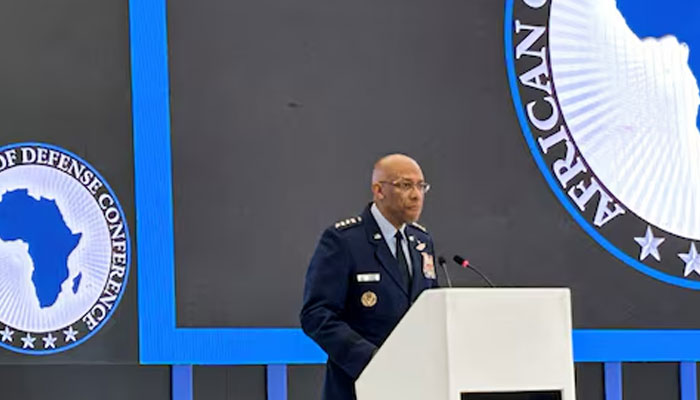Top US general makes unannounced ME trip as Iran threat looms
AMMAN: The top U.S. general began an unannounced visit to the Middle East on Saturday to discuss ways to avoid any new escalation in tensions that could spiral into a broader conflict, as the region braces for a threatened Iranian attack against Israel.
Air Force General C.Q. Brown, chairman of the Joint Chiefs of Staff, began his trip in Jordan and said he will also travel to Egypt and Israel in the coming days to hear the perspectives of military leaders.
His visit comes as the United States is trying to clinch an elusive Gaza ceasefire-for-hostages deal between Israel and Palestinian militant group Hamas, which Brown said would “help bring down the temperature,” if achieved.
“At the same time, as I talk to my counterparts, what are the things we can do to deter any type of broader escalation and ensure we’re taking all the appropriate steps to (avoid) ... a broader conflict,” Brown told Reuters before landing in Jordan.
Meanwhile, U.S. troops have been attacked by Iran-aligned militia in Syria, Iraq and Jordan.
In recent weeks, the U.S. military has been bolstering its forces in the Middle East to guard against major new attacks by Iran or its allies, sending the Abraham Lincoln aircraft carrier strike group into the region to replace the Theodore Roosevelt carrier strike group.
The United States has also sent an Air Force F-22 Raptor squadron into the region and deployed a cruise missile submarine.
“We brought in additional capability to send a strong message to deter a broader conflict ... but also to protect our forces should they be attacked,” Brown said, saying safeguarding American forces was “paramount.”
Iran has vowed a severe response to the killing of Hamas leader Ismail Haniyeh.
Iran has not publicly indicated what would be the target of an eventual response to the Haniyeh assassination but U.S. officials say they are closely monitoring for any signs that Iran will make good on its threats.
“We stay postured, watching the (intelligence) and force movements,” Brown said.
On Friday, Iran’s new Foreign Minister Abbas Araqchi told his French and British counterparts in telephone conversations that it was his country’s right to retaliate, according to the official IRNA news agency.
Brown did not speculate about what Iran and its allies might do but said he hoped to discuss different scenarios with his Israeli counterpart.
“Particularly, as I engage with my Israeli counterpart, how they might respond, depending on the response that comes from Hezbollah or from Iran,” Brown said.
-
 Royal Family Shares Princess Anne's Photos From Winter Olympics 2026
Royal Family Shares Princess Anne's Photos From Winter Olympics 2026 -
 Tori Spelling Feels 'completely Exhausted' Due To THIS Reason After Divorce
Tori Spelling Feels 'completely Exhausted' Due To THIS Reason After Divorce -
 SpaceX Successfully Launches Crew-12 Long-duration Mission To ISS
SpaceX Successfully Launches Crew-12 Long-duration Mission To ISS -
 PlayStation State Of Play February Showcase: Full List Of Announcements
PlayStation State Of Play February Showcase: Full List Of Announcements -
 Ed Sheeran, Coldplay Caught Up In Jeffrey Epstein Scandal
Ed Sheeran, Coldplay Caught Up In Jeffrey Epstein Scandal -
 Paul Anthony Kelly Reveals How He Nailed Voice Of JFK Jr.
Paul Anthony Kelly Reveals How He Nailed Voice Of JFK Jr. -
 US, China Held Anti-narcotics, Intelligence Meeting: State Media Reports
US, China Held Anti-narcotics, Intelligence Meeting: State Media Reports -
 Victoria, David Beckham React To Marc Anthony Defending Them Amid Brooklyn Drama
Victoria, David Beckham React To Marc Anthony Defending Them Amid Brooklyn Drama -
 Victoria Wood's Battle With Insecurities Exposed After Her Death
Victoria Wood's Battle With Insecurities Exposed After Her Death -
 Prince Harry Lands Meghan Markle In Fresh Trouble Amid 'emotional' Distance In Marriage
Prince Harry Lands Meghan Markle In Fresh Trouble Amid 'emotional' Distance In Marriage -
 Goldman Sachs’ Top Lawyer Resigns Over Epstein Connections
Goldman Sachs’ Top Lawyer Resigns Over Epstein Connections -
 How Kim Kardashian Made Her Psoriasis ‘almost’ Disappear
How Kim Kardashian Made Her Psoriasis ‘almost’ Disappear -
 Gemini AI: How Hackers Attempt To Extract And Replicate Model Capabilities With Prompts?
Gemini AI: How Hackers Attempt To Extract And Replicate Model Capabilities With Prompts? -
 Palace Reacts To Shocking Reports Of King Charles Funding Andrew’s £12m Settlement
Palace Reacts To Shocking Reports Of King Charles Funding Andrew’s £12m Settlement -
 Megan Fox 'horrified' After Ex-Machine Gun Kelly's 'risky Behavior' Comes To Light
Megan Fox 'horrified' After Ex-Machine Gun Kelly's 'risky Behavior' Comes To Light -
 Prince William's True Feelings For Sarah Ferguson Exposed Amid Epstein Scandal
Prince William's True Feelings For Sarah Ferguson Exposed Amid Epstein Scandal




